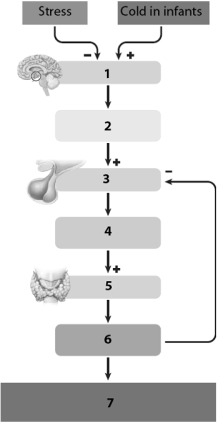Exam 19: The Peripheral Endocrine Glands
Exam 1: Introduction to Physiology and Homeostasis115 Questions
Exam 2: Cell Physiology207 Questions
Exam 3: The Plasma Membrane and Membrane Potential250 Questions
Exam 4: Principles of Neural and Hormonal Communication231 Questions
Exam 5: The Central Nervous System323 Questions
Exam 6: The Peripheral Nervous System: Afferent Division Special Senses280 Questions
Exam 7: The Peripheral Nervous System: Efferent Division175 Questions
Exam 8: Muscle Physiology321 Questions
Exam 9: Cardiac Physiology300 Questions
Exam 10: The Blood Vessels and Blood Pressure249 Questions
Exam 11: The Blood242 Questions
Exam 12: Body Defenses250 Questions
Exam 13: The Respiratory System283 Questions
Exam 14: The Urinary System316 Questions
Exam 15: Fluid and Acid-Base Balance291 Questions
Exam 16: The Digestive System318 Questions
Exam 17: Energy Balance and Temperature Regulation175 Questions
Exam 18: Principles of Endocrinology: the Central Endocrine Glands289 Questions
Exam 19: The Peripheral Endocrine Glands344 Questions
Exam 20: The Reproductive System330 Questions
Select questions type
An increase in plasma levels of ACTH leads to an increase in plasma _______ levels.
(Multiple Choice)
4.7/5  (34)
(34)
__________ stimulates _________ secretion by means of an excitation-secretion coupling process.
(Multiple Choice)
4.9/5  (34)
(34)
Match the hormone with the correct characteristic.
a.ACTH
b.aldosterone
c.calcitonin
d.cortisol
e.DHEA
f.epinephrine
g.glucagon
h.insulin
i.parathyroid hormone
j.thyroid hormone
k.Vitamin D
-Stimulates glycogenesis
(Short Answer)
4.9/5  (33)
(33)
Indicate which characteristics apply to the hormones by using the following answer code.
a.epinephrine
b.cortisol
c.aldosterone
d.dehydroepiandrosterone
e.epinephrine and cortisol
f.cortisol and aldosterone
-Exerts a glucose-sparing effect by inhibiting glucose uptake by many tissues but not the brain
(Short Answer)
4.8/5  (36)
(36)
Indicate which characteristics apply to the hormones by using the following answer code.
a.epinephrine
b.cortisol
c.aldosterone
d.dehydroepiandrosterone
e.epinephrine and cortisol
f.cortisol and aldosterone
-Is secreted in excess in Conn's syndrome
(Short Answer)
4.7/5  (32)
(32)
Match the hormone with the correct characteristic.
a.ACTH
b.aldosterone
c.calcitonin
d.cortisol
e.DHEA
f.epinephrine
g.glucagon
h.insulin
i.parathyroid hormone
j.thyroid hormone
k.Vitamin D
-Stimulates cortisol secretion
(Short Answer)
5.0/5  (30)
(30)
The most abundant and physiologically important adrenal sex hormone is
(Multiple Choice)
4.8/5  (32)
(32)
 Use this figure to answer the corresponding questions.
-The target of TSH is the ____________________, which is labeled number ____.
Use this figure to answer the corresponding questions.
-The target of TSH is the ____________________, which is labeled number ____.
(Short Answer)
4.7/5  (37)
(37)
Vitamin D must be activated by the ____________________ and ____________________.
(Short Answer)
5.0/5  (26)
(26)
Once a structural protein is synthesized, it remains a part of the cell for the duration of the cell's life.
(True/False)
5.0/5  (28)
(28)
Indicate the effect each item in the top column has on the secretion rate of the hormone in the bottom column by writing the appropriate letter using the answer code below.
a.increases
b.decreases
c.has little or no effect on
-Increased TSH _____ calcitonin.
(Short Answer)
4.8/5  (36)
(36)
Indicate the effect each item in the top column has on the secretion rate of the hormone in the bottom column by writing the appropriate letter using the answer code below.
a.increases
b.decreases
c.has little or no effect on
-Stress _____ cortisol.
(Short Answer)
4.9/5  (46)
(46)
Identify the factors associated with each of the biochemical processes below by writing the appropriate letter in the blank preceding the statement.
a.gluconeogenesis
b.glycogenesis
c.glycogenolysis
d.Both gluconeogenesis and glycogenolysis
e.all of the above
-Stimulated by glucagon and epinephrine
(Short Answer)
5.0/5  (31)
(31)
Match the activities with the appropriate cell by using the following answer code.
a.osteoblast
b.osteocyte
c.osteoclast
d.osteoblast and osteocyte
-Indicate the metabolic effects of each of the hormones below by writing the appropriate letter using the following answer code.
a.increases
b.decreases
c.has no effect on
Insulin
__________blood Fatty aciids.
__________blood armino acids
__________muscle pratein.
Glucagon
__________blood glucose.
__________blood fatty acids.
__________blood amino acid:
_________muscle protein.
Epinephrine
_________blood glucose.
__________blood fatty acids.
___________blood amino acids
__________muscle protein.
Cortisol
_________blood glucose.
_________blood fatty acids.
_________blood amino acids
_________muscle protein.
Growth
___________blood glucose.
hormone
______________blood fatty acids.
______________blood amino acids
______________muscle protein.
(Essay)
4.8/5  (27)
(27)
Showing 321 - 340 of 344
Filters
- Essay(0)
- Multiple Choice(0)
- Short Answer(0)
- True False(0)
- Matching(0)